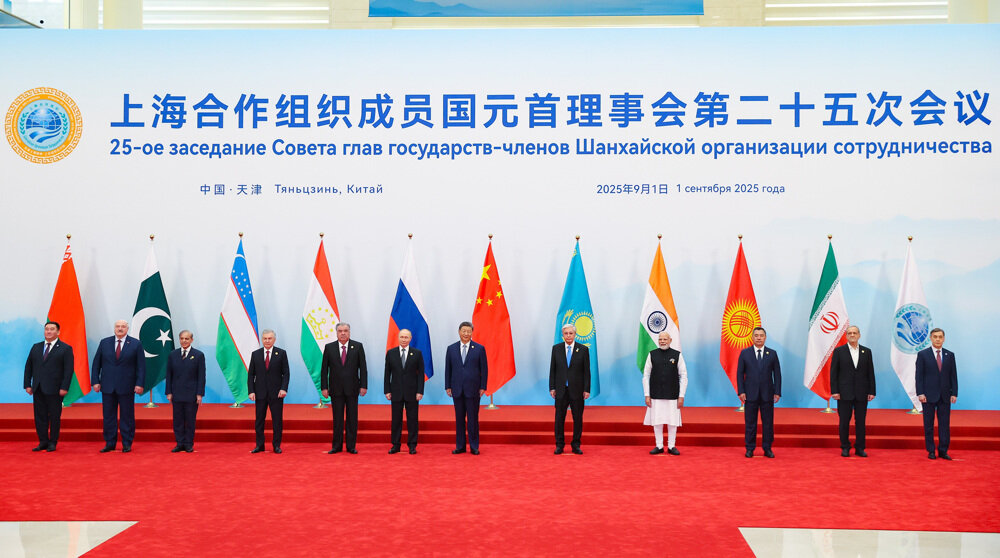SCO ‘strongly’ condemns US-Israeli war against Iran
Multipolarity takes center stage in bloc’s largest-ever summit held in Tianjin, China

TEHRAN – Gathering in China's Tianjin on Monday for the largest-ever summit of the Shanghai Cooperation Organization (SCO), leaders from Asia's major powers displayed a growing determination to chart a new path, diverging from a West increasingly defined by heavy-handed U.S. policies and Europe's struggle for relevance.
Iranian President Masoud Pezeshkian joined over 20 foreign leaders at the SCO summit, including India's Narendra Modi, Russia's Vladimir Putin, and Pakistan's Shehbaz Sharif. Iran became an SCO member in 2024, under the late President Ebrahim Raisi whose administration was particularly keen to forge closer ties with Asian nations.
The SCO was established in 2001, and currently consists of 10 countries. After its expansion last year, member states have made increasing calls to turn the organization into a hub for deeper cooperation and multi-lateral exchange. The return of Donald Trump to the White House and his aggressive trade policies have further compelled countries to pivot towards the Global South in recent months.
During his speech at the summit, Pezeshkian addressed one of Iran’s most important concerns: Western sanctions. “The Islamic Republic of Iran believes that the Shanghai Cooperation Organization, as one of the important pillars of the multipolarization of the international system, should take practical, clear, and specific steps in two parallel paths to create a more peaceful world and a world conducive to expanding economic cooperation,” the president stated.
To fortify economic ties among SCO members and shield them from the weaponization of Western sanctions, Pezeshkian proposed the "Accounts and Settlements of the Shanghai Cooperation Organization."
The initiative would empower member states by promoting settlements in national currencies to diminish dependence on the U.S. dollar, establishing a secure shared digital infrastructure utilizing central bank digital currencies for efficient payments, and creating a multilateral currency swap fund to aid nations targeted by sanctions or liquidity crises.
“We believe that the implementation of this initiative can not only enhance the economic resilience of the members but can also turn the Shanghai Cooperation Organization into a successful model for establishing a multipolar, fair, and resilient financial order against external pressures,” the Iranian president explained.
The president also pointed to Iran’s unique geographical and transit position as well as its access to different parts of the world. He said given these characteristics, Iran will be ready to facilitate trade between other member states and create regional connectivity.
Most of Pezeshkian’s political remarks were made at a different summit called the Shanghai Plus. He advised the U.S. and Europe to end their confrontational approach in foreign policy and instead, embrace diplomacy. “Iran is ready to find a diplomatic and peaceful solution to issues regarding its nuclear energy program,” the president stated.
Another important development concerning Iran was the condemnation of the US-Israeli airstrikes that targeted Iran this past June. The SCO ended up publishing a joint statement that slammed the aggression “very strongly” and characterized the attacks, which hit civilian, nuclear, and military sites, as fragrant breaches of international law, the UN Charter, and Iranian sovereignty. “Such acts pose serious threats to peace and stability, endangering international security on a regional and global scale,” the statement read.
The SCO member states also highlighted the “critical” need for the permanent safety of nuclear facilities even during warfare, to protect people and the environment.
The statement addressed Europe’s invocation of the so-called snapback mechanism, which would bring back pre-JCPOA UN sanctions against Iran if not stopped or extended in a month. SCO members repeated what has been Iran’s stance since 2018, when the U.S. officially left the JCPOA and Europe scrapped its commitments: that both sides to an agreement must uphold their commitments.
Leave a Comment